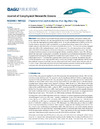Identificador persistente para citar o vincular este elemento:
https://accedacris.ulpgc.es/jspui/handle/10553/35471
| Título: | Characteristics and evolution of an Agulhas ring | Autores/as: | Casanova-Masjoan, M. Pelegrí Llopart,José Luis Sangrá Inciarte, Pablo Martínez-Marrero, Antonio Grisolía Santos, Diana Perez Hernandez, Maria Dolores Hernández-Guerra, A. |
Clasificación UNESCO: | 2510 Oceanografía | Palabras clave: | Agulhas ring Rotational transport Altimetry Drifters Property anomalies |
Fecha de publicación: | 2017 | Publicación seriada: | Journal of geophysical research. Oceans | Resumen: | A South Atlantic ring is studied through remote sensing altimetry, hydrographic stations, and drifters' trajectories. The ring's core was characterized by warmer and saltier Indian Ocean waters. At the time of the cruise, the ring's signature extended radially out to 124 km and vertically down to 2000 m, and its core absolute dynamic topography (ADT) exceeded the surrounding Atlantic Ocean waters in 0.4 m. The geostrophic velocities were anticyclonic with maximum speeds about 35 cm s(-1) at 100 m and reaching negligible values near 4500 m. The rotational transport inside the ring was 33 Sv in the thermocline and intermediate layers. The drifters' data distinguish a 30-km core revolving as a solid body with periodicity near 5 days and a transitional band that revolves with constant tangential velocity, resembling a Rankine vortex. The ADT data identify the ring's track, showing that it was shed by the Agulhas Current retroflection in November 2009 and propagated northwest rapidly during the first 2 months (mean speed of about 10 cm s(-1)) but slowed down substantially (3-4 cm s(-1)) between March and July 2010, when it was last detected. The altimetry data also outlines the evolution of the ring's core ADT, radius, vorticity, and, through a simple calibration with the cruise data, rotational transport. In particular, the ring surface and vertical-mean vorticity decay with time scales of 373 and 230 days, respectively, indicating that most of the property anomalies contained by the ring are diffused out to the subtropical gyre before it reaches the western boundary current system. | URI: | https://accedacris.ulpgc.es/handle/10553/35471 | ISSN: | 2169-9275 | DOI: | 10.1002/2017JC012969 | Fuente: | Journal of Geophysical Research: Oceans [ISSN 2169-9275], v. 122, p. 7049-7065 |
| Colección: | Artículos |
Citas SCOPUSTM
26
actualizado el 08-jun-2025
Citas de WEB OF SCIENCETM
Citations
26
actualizado el 15-feb-2026
Visitas 10
72
actualizado el 11-ene-2026
Descargas
129
actualizado el 11-ene-2026
Google ScholarTM
Verifica
Altmetric
Comparte
Exporta metadatos
Los elementos en ULPGC accedaCRIS están protegidos por derechos de autor con todos los derechos reservados, a menos que se indique lo contrario.
